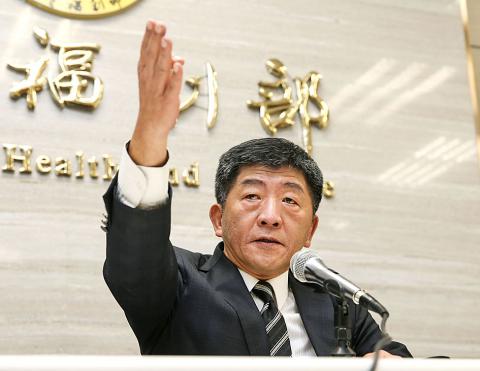The government yesterday denounced Taiwan’s exclusion from this year’s World Health Assembly (WHA), but said it would still send a delegation to Geneva, Switzerland, at the time the 10-day conference is being held.
Taiwan had hoped to once again attend the WHA, to be held in Geneva from May 22 to May 31, as an observer, but it did not receive an invitation from the WHO by the deadline on Monday for online registration because of Chinese obstruction.
The WHA is the WHO’s decisionmaking body.

Photo: CNA
Ministry of Foreign Affairs spokesperson Eleanor Wang (王珮玲) said that Minister of Health and Welfare Chen Shih-chung (陳時中) would lead a delegation to Geneva at the time of the WHA.
If the delegation is not allowed to enter the conference venue, it would still take the opportunity to hold bilateral meetings on the sidelines with delegations of participating nations, Wang said.
Taiwan would have several opportunities to exchange views on global health issues with representatives from other nations during the WHA, she said.
The ministry also said in a statement that if the WHO “succumbs to political pressure” and ultimately decides not to invite Taiwan to the WHA, it would affect the health rights of the 23 million Taiwanese and create a serious gap in the international health system.
At a separate news conference yesterday, Chen said that “the main purpose of attending the WHA is to protect the health and safety of all Taiwanese,” adding that Taiwan also hopes to provide professional, substantial and meaningful contributions to help protect the health and safety of people around the world.
Chen said that if he comes across China’s representative on the sidelines of the WHA, he would stress the importance of Taiwan’s participation in light of global efforts to combat epidemics.
Meanwhile, the Mainland Affairs Council strongly protested China’s obstruction of Taiwan’s participation at the meeting.
In a statement yesterday, the council accused Beijing of using “unilateral political reasons” to exert pressure on the WHO and block it from extending an invitation to Taiwan to attend this year’s WHA.
“The Mainland Affairs Council expresses strong discontent and protests this suppression of our government in violation of the mission of the WHO, as well as the rights and interests of Taiwan’s 23 million people,” the council said.
Beijing has been obstructing the nation’s bids to take part in the International Civil Aviation Organization and the WHO in an attempt to exert pressure on Taipei to achieve its political objectives, it said.
“We will never succumb to Beijing’s pressure, but will continue to make our voice heard in the international community, and fight for our right to participate in the WHA and other international organizations,” the council said.
Saying that the nation’s participation in the WHA was highly anticipated by Taiwanese, the council urged Beijing to carefully consider the consequences of the move and the possible damage it could cause to cross-strait relations.
Additional reporting by Lee I-chia

INVESTIGATION: The case is the latest instance of a DPP figure being implicated in an espionage network accused of allegedly leaking information to Chinese intelligence Democratic Progressive Party (DPP) member Ho Jen-chieh (何仁傑) was detained and held incommunicado yesterday on suspicion of spying for China during his tenure as assistant to then-minister of foreign affairs Joseph Wu (吳釗燮). The Taipei District Prosecutors’ Office said Ho was implicated during its investigation into alleged spying activities by former Presidential Office consultant Wu Shang-yu (吳尚雨). Prosecutors said there is reason to believe Ho breached the National Security Act (國家安全法) by leaking classified Ministry of Foreign Affairs information to Chinese intelligence. Following interrogation, prosecutors petitioned the Taipei District Court to detain Ho, citing concerns over potential collusion or tampering of evidence. The

Seventy percent of middle and elementary schools now conduct English classes entirely in English, the Ministry of Education said, as it encourages schools nationwide to adopt this practice Minister of Education (MOE) Cheng Ying-yao (鄭英耀) is scheduled to present a report on the government’s bilingual education policy to the Legislative Yuan’s Education and Culture Committee today. The report would outline strategies aimed at expanding access to education, reducing regional disparities and improving talent cultivation. Implementation of bilingual education policies has varied across local governments, occasionally drawing public criticism. For example, some schools have required teachers of non-English subjects to pass English proficiency

NEGOTIATIONS: The US response to the countermeasures and plans Taiwan presented has been positive, including boosting procurement and investment, the president said Taiwan is included in the first group for trade negotiations with the US, President William Lai (賴清德) said yesterday, as he seeks to shield Taiwanese exporters from a 32 percent tariff. In Washington, US Trade Representative Jamieson Greer said in an interview on Fox News on Thursday that he would speak to his Taiwanese and Israeli counterparts yesterday about tariffs after holding a long discussion with the Vietnamese earlier. US President Donald Trump on Wednesday postponed punishing levies on multiple trade partners, including Taiwan, for three months after trillions of US dollars were wiped off global markets. He has maintained a 10 percent

TRADE: The premier pledged safeguards on ‘Made in Taiwan’ labeling, anti-dumping measures and stricter export controls to strengthen its position in trade talks Products labeled “made in Taiwan” must be genuinely made in Taiwan, Premier Cho Jung-tai (卓榮泰) said yesterday, vowing to enforce strict safeguards against “origin laundering” and initiate anti-dumping investigations to prevent China dumping its products in Taiwan. Cho made the remarks in a discussion session with representatives from industries in Kaohsiung. In response to the US government’s recent announcement of “reciprocal” tariffs on its trading partners, President William Lai (賴清德) and Cho last week began a series of consultations with industry leaders nationwide to gather feedback and address concerns. Taiwanese and US officials held a videoconference on Friday evening to discuss the